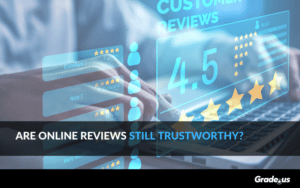Your Reputation is Your Business.
Let’s face facts: running a business is far from easy. Local business owners could use all the help they can get. Managing employees, keeping customers happy all while trying to stay profitable…the day-to-day tasks that keep a business afloat can be draining (to put it mildly).
Damage control matters, but there are plenty of local business owners that understand how important it is to focus on the future as well. Surviving is nice, but thriving is just about every local business owner’s endgame. Understanding that the average business owner appreciates tangible advice, you could share some tactics they can use to get more online reviews. For example:
- Requesting a review promptly after a sale
- Following up requests via email
- Being transparent on digital/social media and asking for constructive feedback
At the end of the day, discussing online marketing with local business owners typically comes down to setting realistic expectations. Growth is absolutely going to happen, but it’s unlikely that it’ll be at breakneck speeds. So, when a firm that specializes in ‘Reputation Management’ claims that they can help them become an online authority overnight, it’s no surprise that some of your potential clients might be tempted to take advantage of that offer.
We all know that building a positive online presence matters, after all. In fact, a study by the Harvard Business School found that a single star increase in a Yelp rating can lead to as much as a 9% increase in revenue!
There’s just one problem: any company that offers local business owners overnight results is almost definitely using black hat marketing. More importantly, those overnight results can end up costing local business owners quite a bit down the line.
What on Earth is ‘Black Hat Marketing’?
Okay, before we dive into deep-end of the review management world, let’s take a step back and properly set the stage. To properly understand this topic, we need to establish exactly what black hat marketing is.
‘Black hat marketing’ is basically an umbrella term for tactics ranging from the unethical to downright illegal. Essentially, firms will find ways to manipulate a search engine into believing that a specific local business website has actually become an online authority.
Believe it or not, there was once a time when plenty of SEO firms were using black hat techniques and pulling the wool over Google’s eyes. That being said–those days are long gone. Google has added increasingly advanced updates to their algorithm, making it near impossible to use most black hat techniques.
While there are a variety of different techniques that these firms can use to abuse search engine systems (Link Farming, Cloaking, Gateway Pages, etc.), the one that business owners really have to watch out for is fake reviews.
The reality of fake reviews is that firms use them because they can add quite a bit of value to a business owner’s site (provided they manage to actually trick Google for longer than 24 hours, which is no easy feat). In the best case scenario, fake reviews can:
- Help business owners rank higher on online review sites (Yelp, Google, etc.)
- Rank higher for Search Engine Results Pages (or SERP)
- Give the impression of consistent reviews (which leads to SEO benefits)
All of which would be invaluable–if it actually worked.
And that’s really the biggest problem with fake reviews: at the end of the day, they don’t work. Sure, tricking the complex Google algorithms might get a website on the first page of Google search results for a day or two (for now). But once Google realizes that the website has no business on the first page, they’ll do more than just take the local business owner’s website off the first page.
Since ‘unethical web practices’ actually violate their Terms of Service, Google is perfectly within their rights to blacklist them. That’s right: using black hat techniques like fake reviews can prompt companies like Google to ban businesses from their search results entirely. And if we’re being honest, if Google says a business don’t exist–they don’t.
Aside from being purely unethical, fake reviews can actually land business owners in legal trouble too. In 2013, the New York Attorney General’s office put out a press release stating that they had found 19 major companies providing fake reviews for a variety of businesses.
Review sites like Yelp were flooded with fake reviews, with overseas contractors posting fake reviews almost daily. Their punishment? More than $350,000 in fines for violating multiple state laws prohibiting false advertising and engaging in illegal/deceptive business practices. If the threat of losing access to an audience of millions via Google and other search engines don’t scare business owners enough, keep in mind that what these firms are doing is downright illegal.
The Future of Review Management

So, by this point, business owners understand exactly how risky black hat tactics are. Aside from gambling with a business’s web presence, it’s just not an effective way to handle online marketing. So, what are the options that business owners should actually be looking to?
It’s clear that in today’s digital-first world, having an online presence is basically a necessity. Something has to be done, but for people who don’t know anything about online marketing or review management, the path towards being seen as an online authority can seem pretty intimidating.
The cornerstone of any successful online marketing campaign is having a fantastic reputation. But how does the average local business owner go about building that reputation when it seems like most people won’t leave their company any reviews?
The important thing to remember here is that building a reputation for excellence is a marathon, not a sprint. If businesses try to use tactics that manipulate the system, they’re setting themselves up for failure. The key here is to have local business owners encourage their audience to spread their praise and (just as importantly) to share their complaints and concerns with the business so they can improve the overall customer experience.

Put the focus back on the user experience and watch everything else fall back into place.
The real underlying problem with ‘marketing solutions’ like fake reviews is that they treat the symptom, not the illness. Forget about how illegal or unethical they are for a second. While the short term advantage might be substantial (who wouldn’t want to be on the first page of Google’s search results?), the real issue is that people online don’t trust this business yet. Why? Because the average person hasn’t heard enough about this local business to associate their company name with reliability.
How can they fix that? By opening up the floor for conversation. Customers past and present are more than willing to give their two cents on local business–as long as the website makes it easy for them. Ideally, your online review management strategy should end up being a system designed with one purpose in mind: make reviews simple.
At first, you’d want to start by focusing on the user experience. Creating routines for customers should be your best bet. Consistently ask for reviews and make the review process an experience for the customer.
Think of it this way:
Customers shouldn’t just be used to leaving reviews, they should be excited about it.
Beyond that, you’d need to not only find a way make it easy for a local business’s audience to leave reviews on reputable review sites (Google, Yelp, you name it), but make it even easier for businesses to guide their audience to the promised land. Review funnels, review filters, and mobile-optimized everything would mean that developing a positive reputation in a digital world wouldn’t have to be a pipedream for your clients.
With the right tools, the right tactics, and the support of an adoring audience, any local business can go from internet obscurity to trusted online authority.
About the Author
Brian Leguizamon
Hey, I'm a content marketer that's worked with companies like Shopify and Gigster, solving startup problems daily. Check me out on Medium. Or don't. Your call.










